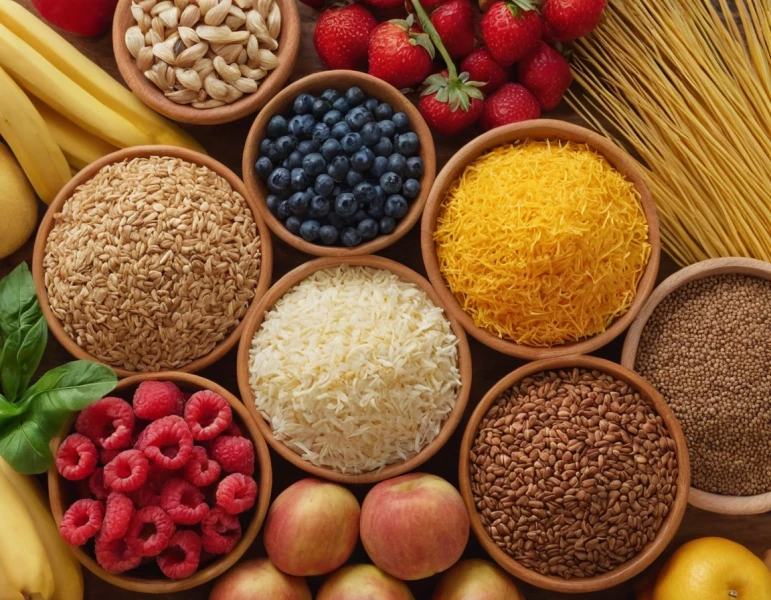Educa UNIVERSITY|HEALTH
What fiber is useful for health
Related Masters
What fiber is useful for health
Hello! I'm Amadeo Pérez, and today I'm here to talk to you about fiber and its health benefits, from my own experience. Throughout my life, I have gone through times when my intestinal health has played more than one bad trick on me. But, my friend, everything changed when I understood the great power that fiber has in our body.
Fiber is not just that supplement they recommend on TV to avoid constipation. No, sir. Fiber is much more than that. It is the pillar of good digestion and a natural protector against many diseases. If you want to know what fiber is good for health, stay with me because I will explain it in depth.

What is fiber?
First, let's take it one step at a time. Fiber is an essential part of plant-based foods that the body cannot fully digest or absorb. Unlike other nutrients such as fats or proteins, fiber passes through the digestive system almost intact. And it is precisely this characteristic that allows it to perform its multiple functions in the body.
There are two main types of fiber:
- Soluble fiber: It dissolves in water and forms a gel that helps slow digestion. This is particularly useful for regulating blood sugar levels and controlling cholesterol.
- Insoluble fiber: This, on the other hand, adds bulk to the stool and makes it easier for food to pass through the intestine, which prevents constipation.
Health benefits of fiber
I'm going to be straight with you. If you're not consuming enough fiber, your body is going to let you know. I've been in that situation and believe me, it's not pleasant. But when I started including more fiber in my diet, the changes were amazing.
- It improves digestion
This is the most obvious and known benefit. Fiber regulates intestinal transit, avoiding that dreaded constipation that can make your life hell. This is mainly due to insoluble fiber, which adds bulk to the stool and facilitates its expulsion. - Controls blood sugar
For people with diabetes or those who want to prevent it, soluble fiber is a lifesaver. It helps slow sugar absorption, which prevents those glucose spikes that can be dangerous. - Reduces cholesterol
If you have cholesterol problems (as happened to me a few years ago), you should know that soluble fiber also binds to cholesterol molecules in the intestine, helping to eliminate them from the body. This reduces cholesterol levels in the blood and, therefore, the risk of cardiovascular disease. - Contributes to weight control
This point is key if you are looking to maintain your weight or lose a few pounds. Fiber-rich foods are more satier, which helps you feel fuller for longer. This keeps you from ending up snacking between meals and, in the long run, contributes to weight control
Diseases it helps prevent
You already know the benefits of fiber, but let me tell you something else: fiber prevents serious diseases. It's not just a matter of being "regular". No! It's a silent guardian of your health!
- Heart disease
As I mentioned before, soluble fiber reduces cholesterol. This in turn decreases the risk of heart disease, something we should all be very aware of. - Type 2 diabetes
As it helps control blood sugar levels, regular fiber consumption can reduce the risk of developing type 2 diabetes. Studies back this up, and I assure you it's worth considering if you have a family history of this disease. - Colon cancer
This is another important benefit. Fiber facilitates intestinal transit, which decreases the time toxic substances spend in the digestive tract. This can help prevent colon cancer, one of the most common forms of cancer. - Fruits: Apples, pears, oranges.
- Vegetables: Broccoli, carrots, spinach.
- Pulses: Lentils, chickpeas, beans.
- Whole grains: Oatmeal, brown rice, whole-wheat bread.
How to increase fiber intake
If you've gotten this far, you're probably wondering, "Amadeo, how do I get more fiber into my life?" Relax, I'll explain. You don't need to make big sacrifices, you simply need to be more conscious of the foods you eat.
Some foods rich in fiber are:
I myself switched from sugary cereals to oatmeal for breakfast, and started eating more fruits and vegetables. The change was drastic.
Conclusion
In short, fiber is fundamental to our health. Not only does it improve digestion, but it also helps prevent serious diseases such as cardiovascular disease, type 2 diabetes, and colon cancer. If you are still not consuming enough fiber, it's time to make a change.
Faculties
Trainings
The faculties embrace diverse academic disciplines and fields of study, opening doors to new perspectives and exploring different spheres of wisdom in a constantly evolving world.














